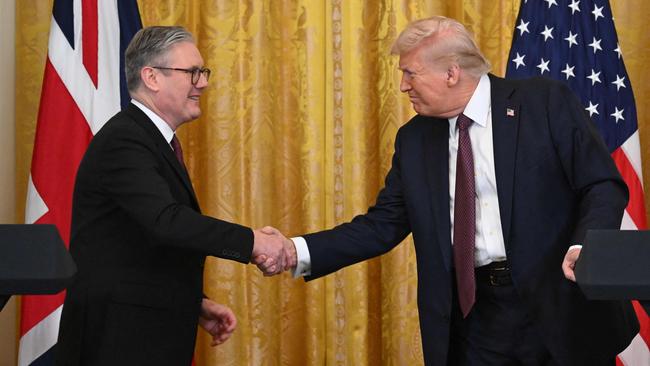Starmer will resist imposing retaliatory tariffs on America’s ‘Liberation Day
The British Prime Minister will ‘react calmly’ if Donald Trump imposes tariffs on UK goods, but is reserving the right to retaliate if negotiations fail.

Keir Starmer will resist putting retaliatory tariffs on American goods even if British exporters are hit by US duties on Wednesday.
President Donald Trump has vowed to impose levies on a wide range of goods from April 2, which he has declared “Liberation Day”.
Sir Keir’s hopes of securing an exemption for British businesses have faded despite the efforts of Jonathan Reynolds, the Business Secretary, to secure a bespoke trade agreement.
Mr Reynolds described talks last week as “challenging”.
The Office for Budget Responsibility, the government’s spending watchdog, has said US tariffs of 20 per cent would wipe 0.6 per cent off GDP growth by 2026, rising to 1 per cent if the government imposed retaliatory tariffs.
Britain exports more than 60bn of goods to the US annually.
Having already announced 25 per cent levies on cars, steel and aluminium imports, Mr Trump is expected to impose reciprocal tariffs on countries with which the US has a trade imbalance or those he regards as imposing unfair taxes or regulation.
White House officials have singled out the EU’s VAT as an example of an unfair tax. The EU has promised a “robust” response to any “unfair” tariffs. British officials have drawn up a package of retaliatory tariffs to be implemented in response to US duties. Officials believe Mr Trump is most likely to charge 20 per cent tariffs, corresponding to the UK rate of VAT.
However, British retaliatory tariffs will not come into effect immediately and ministers are hopeful of continuing negotiations with the US after April 2.
“We are not in the same place as the EU,” a No 10 source said. “We will react coolly and calmly to whatever is announced on Wednesday and keep negotiating hard but we reserve the right to begin the retaliation process.”
In a phone call on Sunday, Sir Keir and Mr Trump discussed “productive negotiations” towards a UK-US economic prosperity deal and agreed these would “continue at pace”, Downing Street said.
British businesses are keen to avoid being dragged into an escalating trade war and many have urged caution. Although there are no imminent plans for travel, Mr Reynolds could be asked to return to Washington at a moment’s notice.
The US is the second most important market for British cars, which will be hit with a 25 per cent tariff from April 3. Britain exports about 100,000 cars to the US each year, worth £7.6bn. Luxury brands are among those that could be hardest hit.
The Times



To join the conversation, please log in. Don't have an account? Register
Join the conversation, you are commenting as Logout